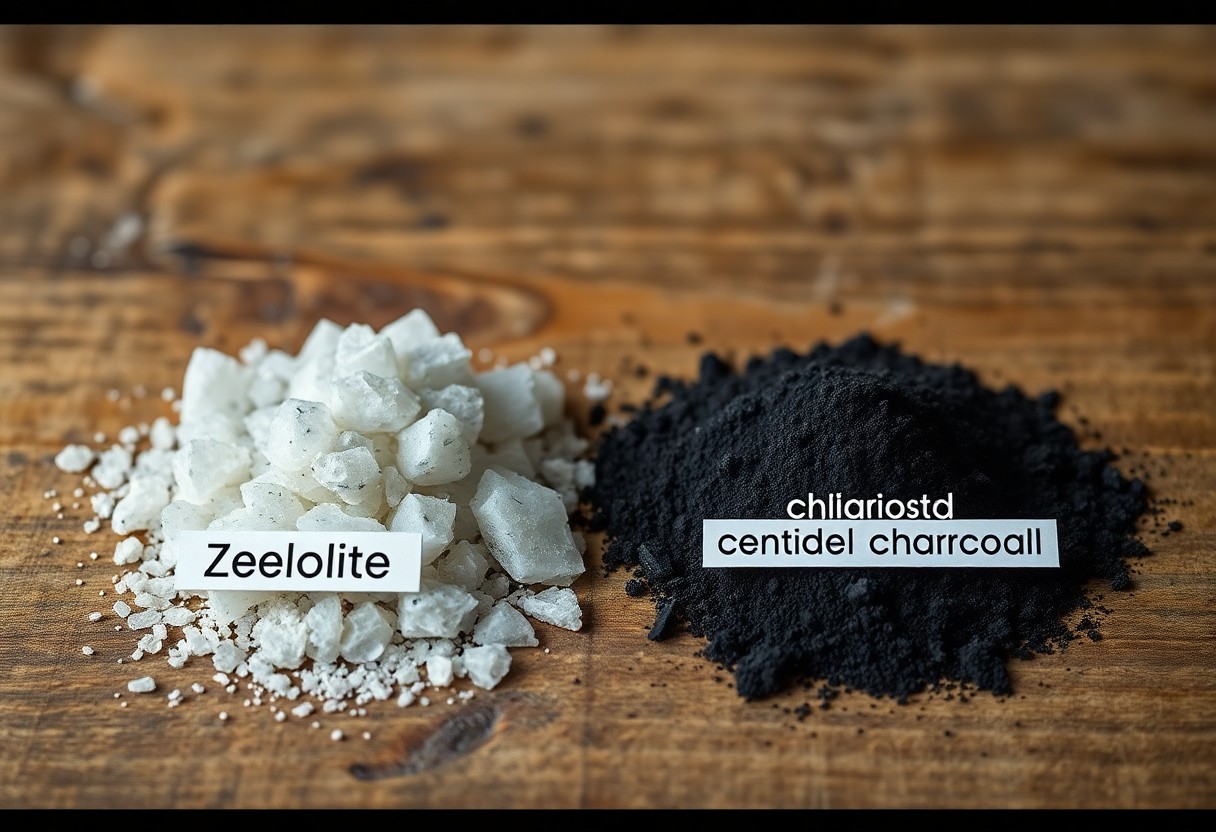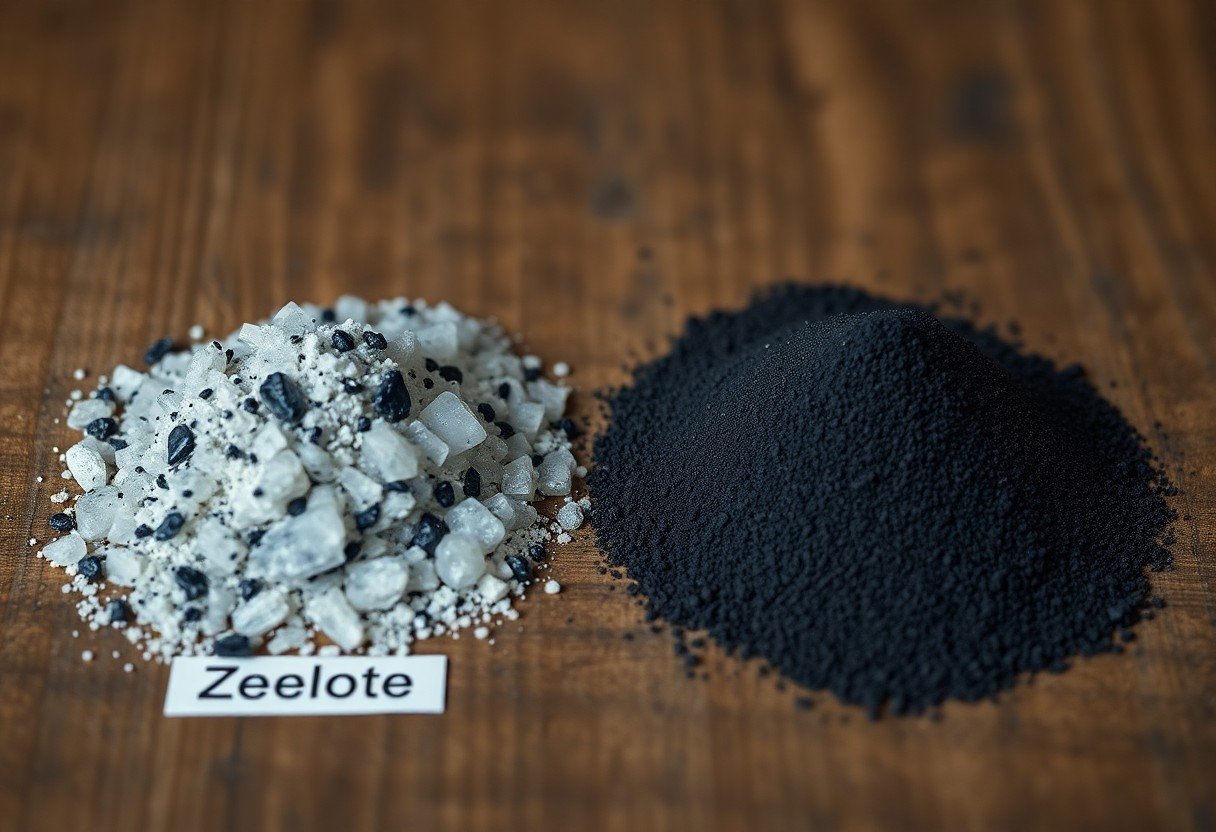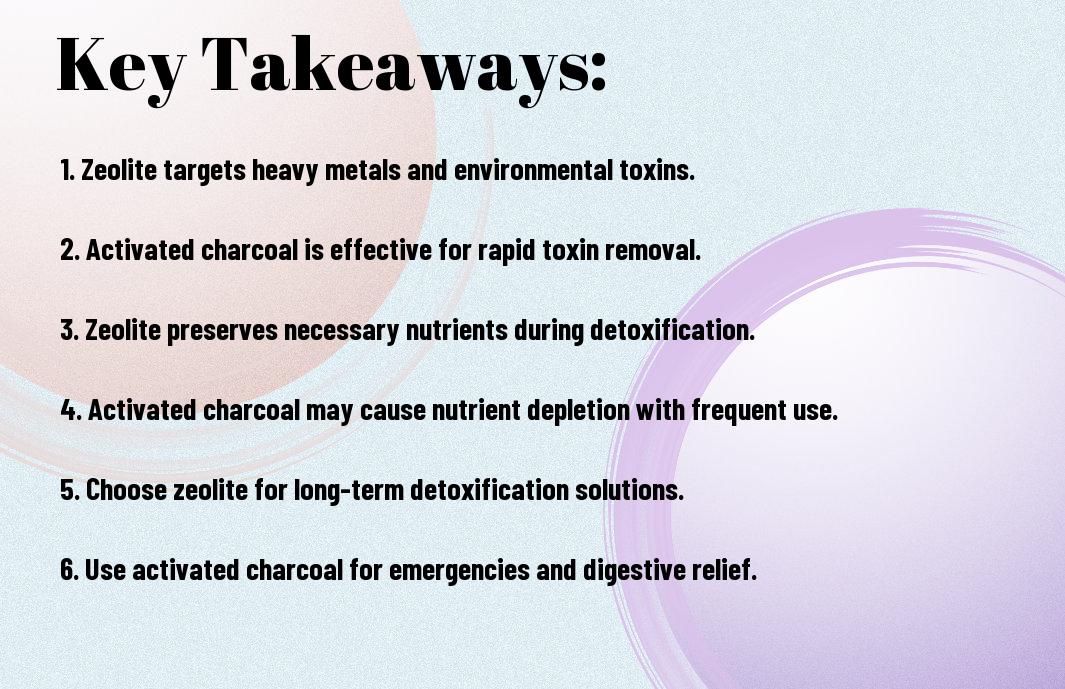When it comes to detoxification, two powerful natural substances often come into play: zeolite and activated charcoal. Both are renowned for their ability to trap toxins and cleanse the body, but which one is more effective? In this article, we’ll break down their differences, benefits, and best uses to help you decide which detox method suits your needs.
Table of Contents
Key Takeaways:
- Zeolite is more selective in toxin removal, specifically targeting heavy metals and harmful substances while preserving beneficial minerals in the body
- Activated charcoal excels at rapid toxin absorption but may also remove important nutrients, making it better suited for emergency situations rather than daily use
- Zeolite is optimal for long-term, gentle detoxification, while activated charcoal works best for acute cases like food poisoning or bloating
- The molecular structure of zeolite allows for toxin elimination through both urine and feces, whereas activated charcoal works primarily through the digestive system
- Both substances have negative charges that attract toxins, but zeolite’s cage-like structure provides a more controlled and sustained detoxification process
Understanding Zeolite
A naturally occurring volcanic mineral, zeolite features a unique honeycomb structure that makes it highly effective for detoxification. You’ll find this remarkable substance contains a negatively charged framework of cavities and channels that can trap positively charged toxins. With over 40 natural zeolite varieties available, clinoptilolite is the most widely used for health applications.
Composition and Natural Properties
Any analysis of zeolite reveals its fascinating crystalline structure composed of aluminum, silicon, and oxygen. Your body can benefit from zeolite’s exceptional ion-exchange capacity, where its negatively charged framework attracts and traps positively charged toxins. The microporous structure, measuring 0.7 to 1.0 nanometers in diameter, creates an ideal molecular sieve for capturing harmful substances.
Detoxification Mechanisms and Benefits
To understand how zeolite works in your body, consider its cage-like structure that acts as a natural trap for toxins. When you take zeolite, it travels through your bloodstream, attracting and binding to heavy metals, ammonia, and other positively charged toxic particles. Studies show zeolite can remove up to 95% of heavy metals from your system within 24-48 hours.
Understanding zeolite’s selective ion exchange capability helps you appreciate why it’s superior for long-term detoxification. Your body benefits from zeolite’s ability to trap toxins while leaving beneficial minerals untouched. Research indicates that regular zeolite use can reduce your heavy metal burden by up to 50% over three months, making it an effective choice for gentle, sustained detoxification.

Understanding Activated Charcoal
While activated charcoal has become increasingly popular in modern detoxification protocols, you should understand its unique properties and mechanisms. As toxin binders play a vital role in the detox process, activated charcoal stands out for its exceptional ability to trap and remove various toxins from your body through a process called adsorption.
Production Process and Structure
To create activated charcoal, manufacturers heat carbon-rich materials like coconut shells, wood, or peat at extremely high temperatures (600-900°C) in the absence of oxygen. This process, called pyrolysis, creates millions of tiny pores throughout the material, expanding its surface area to over 3,000 square meters per gram. The result is a highly porous substance with remarkable binding capabilities.
Absorption Capabilities and Applications
Structure determines activated charcoal’s impressive adsorption capacity, allowing you to benefit from its ability to bind with various substances. Your body can use it to trap toxins, chemicals, and gases, making it particularly effective for emergency detoxification. The material’s vast network of pores can capture particles as small as 0.3 nanometers in size.
In fact, you’ll find activated charcoal’s applications extend beyond internal detoxification. The substance shows remarkable versatility in water purification, air filtration, and even cosmetic applications. Your activated charcoal supplement can bind to and remove up to 100 times its weight in toxins, making it one of the most powerful natural detoxifying agents available.

Comparative Analysis
Once again, when comparing these two powerful detoxifying agents, scientific research shows distinct differences in their effectiveness. Each substance offers unique benefits for your detoxification needs.
| Zeolite | Activated Charcoal |
|---|---|
| Selective toxin binding | Non-selective binding |
| Preserves beneficial minerals | May remove nutrients |
| Long-term daily use | Short-term occasional use |
Toxin Binding Specificity
Analysis shows that zeolite’s molecular cage structure allows for more precise toxin targeting, making it your ideal choice for specific heavy metal removal. Your body can benefit from zeolite’s selective binding, which removes harmful substances while preserving crucial minerals.
Safety and Side Effects
Below are the key differences in safety profiles: while zeolite shows minimal side effects in your system, activated charcoal may cause nutrient depletion if you use it frequently. Your choice should consider these varying safety aspects.
This comprehensive evaluation reveals that your body’s response to each substance varies significantly. You might experience mild constipation with activated charcoal, while zeolite typically causes fewer digestive disruptions. Your individual health condition and detox goals should guide your final selection.
Effectiveness for Different Toxins
Despite their similar detoxifying properties, zeolite and activated charcoal show varying effectiveness for different types of toxins. Your choice between these two methods should depend on the specific toxins you’re targeting. While zeolite excels at binding to heavy metals with its crystalline structure, activated charcoal’s porous surface makes it particularly effective for organic compounds and chemicals.
Heavy Metals Removal
Before choosing your detox method, consider that zeolite demonstrates superior effectiveness in heavy metal removal. You’ll find zeolite can bind up to 90% of heavy metals in your system within 24-48 hours of administration. Your body can better eliminate toxic metals like lead, mercury, and cadmium through zeolite’s selective ion exchange capacity, making it your optimal choice for heavy metal detoxification.
Organic Compounds and Chemicals
Around 60% of organic compounds and chemicals can be effectively removed by activated charcoal due to its large surface area. You’ll find it particularly effective in binding to pesticides, pharmaceutical residues, and industrial chemicals in your system. The microporous structure of activated charcoal provides you with rapid absorption of these compounds.
Removal of organic compounds becomes more efficient when you use activated charcoal within the first hour of exposure. Your body can benefit from its ability to bind to molecules up to 1,000 times its own weight, making it particularly effective for acute exposure to organic toxins. With proper timing, you can achieve up to 74% removal rate of common organic pollutants.
Clinical Evidence and Research
Not all detox methods are created equal, and scientific research shows varying effectiveness between zeolite and activated charcoal. Your understanding of the clinical evidence behind these substances will help you make an informed decision about which detox method best suits your needs. Recent studies have demonstrated promising results for both substances, though their applications differ significantly.
Scientific Studies on Zeolite
Against previous skepticism, recent research has validated zeolite’s detoxification capabilities. Your body can benefit from zeolite’s proven ability to remove heavy metals, as shown in a 2017 study where participants experienced a 50% reduction in heavy metal levels over 12 weeks. Clinical trials have also demonstrated zeolite’s effectiveness in supporting immune function and reducing oxidative stress.
Research on Activated Charcoal Efficacy
Studies consistently support activated charcoal’s role in emergency toxin removal. Your risk of poison absorption can be reduced by up to 74% when activated charcoal is administered within one hour of exposure, according to emergency medicine research. Clinical data shows it’s particularly effective in treating drug overdoses and certain types of poisoning.
The medical community recognizes activated charcoal as a standard treatment in emergency medicine. Your healthcare providers rely on its rapid absorption capabilities, with research showing it can bind to a wide range of toxins within 30 minutes of administration. Multiple studies indicate its effectiveness in reducing bloating and gas by up to 60% in patients with digestive issues.

Practical Applications
Your detox journey can be optimized by understanding how to effectively use both zeolite and activated charcoal in different scenarios. While zeolite works best for daily detoxification and heavy metal removal, activated charcoal excels in acute situations. For comprehensive guidance on selecting the right detox method, you can refer to The Best Binders for Detoxification to make an informed decision.
Recommended Usage Protocols
One effective approach is to take zeolite supplements on an empty stomach, 30 minutes before meals or 2 hours after, starting with a lower dose and gradually increasing it. For activated charcoal, you should take it at least 2 hours away from medications or supplements, using it primarily for specific detox needs rather than daily maintenance.
Complementary Detox Strategies
Among the most effective ways to enhance your detox results is combining either zeolite or activated charcoal with proper hydration, consuming organic foods, and regular exercise. These natural methods can amplify the binding capacity of both substances, leading to more effective toxin removal.
Further supporting your detox journey, you can incorporate additional strategies such as infrared saunas, dry brushing, and liver-supporting herbs. These methods work synergistically with your chosen binder to promote optimal detoxification through multiple pathways in your body.

Final Verdict: Which Detox Method Is More Effective?
If you’re looking for a sustained, safe, and selective detox, zeolite is the better choice. It targets heavy metals and toxins without affecting essential nutrients, making it ideal for daily use. On the other hand, if you need fast detoxification, such as for poisoning or digestive relief, activated charcoal is the superior option due to its strong adsorptive power.
Both have their place in a detox regimen—zeolite for ongoing detoxification and activated charcoal for emergencies. Choosing the right one depends on your specific health goals.
FAQ
Q: What are the main differences between zeolite and activated charcoal in detoxification?
A: Zeolite is a natural volcanic mineral that selectively binds to heavy metals and toxins while preserving beneficial minerals in your body. Activated charcoal, however, is a manufactured substance that binds to all substances indiscriminately, including nutrients and medications. Zeolite works best for long-term detox, while activated charcoal excels in emergency situations like food poisoning.
Q: How long can I safely use each detox method?
A: Zeolite can be used daily for extended periods due to its selective binding properties and natural composition. Activated charcoal should be used for short-term purposes or occasional cleansing, typically 24-72 hours at a time, to avoid potential nutrient deficiencies. Always follow product-specific dosing instructions and consult with a healthcare provider.
Q: Which method is better for removing heavy metals from the body?
A: Zeolite is superior for heavy metal detoxification because its crystalline structure specifically targets and traps heavy metals like lead, mercury, and cadmium. Its negative charge attracts positively charged heavy metals, creating a strong bond that prevents reabsorption. Activated charcoal is less effective for heavy metal removal but works better for organic toxins.
Q: Can I take supplements while using these detox methods?
A: With zeolite, you can take supplements at any time because it doesn’t interfere with nutrient absorption. When using activated charcoal, take supplements at least 2-3 hours before or after, as it may bind to and reduce the effectiveness of supplements, vitamins, and medications. This timing separation ensures optimal absorption of your supplements.
Q: Which detox method is more cost-effective for regular use?
A: Zeolite tends to be more cost-effective for regular use because it can be taken daily without causing nutrient deficiencies, requiring fewer supplemental products. Activated charcoal, while often cheaper per unit, may incur additional costs from having to replenish nutrients it removes and should only be used occasionally, making it less practical for ongoing detoxification needs.
Recent Posts
Revitalize your health with an innovative detox approach offered by Root Wellness. This powerful solution enhances wellness through natural ingredients like zeolite and silica, effectively cleansing...
Roots Clean Slate Erfahrungen Revitalize With Bioavailable Silicon
Revitalizing your health begins with a natural approach to removing harmful substances. Detoxification can pave the way for a more vibrant life through effective cleansing methods. Bioavailable...
